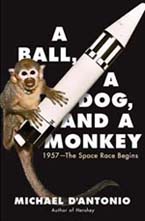 |
 |
| current issue |  |
past issues |  |
send a letter/news |  |
address update |  |
advertise |  |
about us |  |
alumni home |
Previews
Books, music, art, theater, film, and danceby Anne Downey '95G
A Ball, a Dog, and a Monkey: 1957 - The Space Race Begins , By Michael D'Antonio '77
Overviews:
J. Dennis Robinson '73
Alice Fogel '85G
Todd Balf '83In Their Own Words:
William McGee '59
Bernard Balser '63
Maurice "Moe" Quirin '72
Ron LeBlond '58Also of Note:
Julie Hardy '99
Jean Mary Flahive '69
Peter Michel
Sandra J. Philipson '70
Louise Rogers '88News from Theatre and Dance alumni: Kendahl Ferguson '03, Elizabeth (Libby) Stevens '05, Michael Graziadei '01, Veronica DiPerna '05, Greg Kalafatas '03, Sean Quinn '05, Laura Halzack '03, Ian Hanna '03, Sara Desmarais '01, Megan Reilly '00, Travis Bedard '99, Trish Vaillancourt '98, Kim Bird '02 and Liam Billingham '05
A Ball, a Dog, and a Monkey: 1957 - The Space Race Begins
See at amazon.com
Michael D'Antonio '77 has written books about a dirt-poor Mexican golfer who made it to the PGA tour, a group of foster boys who retaliated against a system that grossly neglected them, and Milton S. Hershey, an energetic entrepreneur driven by utopian dreams. He is drawn to stories that reveal personal triumph, and a cultural viewpoint that is identifiably American. "I'm always fascinated by the way Americans think at various points in our history, and in my work, I look for exceptional qualities in people that illustrate goodness, or a struggle for something better," he says.

In his new book, A Ball, A Dog, and A Monkey: 1957--The Space Race Begins (Simon & Schuster, 2007), published on the 50th anniversary of Sputnik, he follows the lives of rocket scientists, engineers, military personnel and journalists, both American and Soviet, over the course of one tense, productive, and often thrilling year. D'Antonio says he is the kind of person who needs to know the human dimension of historical facts, and so he embeds other threads in the spinning of his main plot, which makes for a very lively prose style. Here's part of his description of the launch of the American rocket "Juno": "Desperate for confirmation that their most important rocket was performing as it should, [General] Medaris and a few others got into waiting cars and sped to a communications and tracking center set up in a nearby Quonset hut. There a team of analysts led by JPL's Al Hibbs was already racing through calculations based on the apparent speed and angle of the satellite's flight. Hibbs was a slightly famous math whiz with a quirky personality. As a college student he and a friend had studied the mechanics of certain roulette wheels and figured out how to beat the casinos in Vegas. The stunt got them into Life magazine and earned them enough money to buy a sailboat and finance an eighteen-month cruise around the world."
D'Antonio entered UNH knowing that he wanted to be a journalist, and found a supportive community. "Don Murray made me believe that it was possible to be a professional writer who made a living out of ideas and skills, but always held me to a very high standard -- he would praise two or three things in my writing, and criticize 9 or 10," D'Antonio says. "From Andy Merton, I learned how a big part of the writer's task is collecting a lot of material, and then finding the telling anecdote or observation that makes someone fully human."

After graduating, D'Antonio worked at several newspapers, including Foster's Daily Democrat and the Portland Press Herald; he won a Pulitzer Prize as part of a team of reporters at Newsday. In 1990, he won the Alicia Patterson Fellowship which funded a book length project on Christian America, and he has written books ever since.
D'Antonio's interpretation of one crucial year in the space race, based on his copious interviews, leaves the reader with many absorbing impressions. For one, President Eisenhower's concern about the ambition and influence of military leaders and contractors, and his resulting policy, emerges as prescient and judicious. And D'Antonio show that all the folks involved, from the rocket scientists to the animal trainers to the people who rented trailers to the space workers, felt that they were part of something extraordinary. "Our nation responded to a crisis in a way that turned out to be flawed but was still positive," D'Antonio says. "With the space race, we essentially fought a war with the Soviet Union by proxy." ~
| Overviews: |
|
Strawbery Banke: A Seaport Museum 400 Years in the Making
by J. Dennis Robinson '73, This beautiful, painstakingly researched volume is actually three books in one: 400 years of Portsmouth history, the story of Strawbery Banke from its founding in 1957 to the present, and a compelling visual narrative with 375 photographs and illustrations. |
 |
|
Be That Empty: Apologia for Air, Poems
Alice Fogel '85G, In her third, breathtaking collection, Fogel holds emptiness in her hands and examines its many natural dimensions: a shed snakeskin, the spinning of seagulls as they rearrange themselves on the ice, a decomposing leaf. |
 |
|
Major: A Black Athlete, a White Era, and the Fight to Be the World's Fastest Human Being
by Todd Balf '83, In the late 19th Century, track-based bicycle racing was as popular as NASCAR is today. Balf's engaging book is a study of the sport, the politics surrounding it, and a sensitive portrayal of Marshall "Major" Taylor, an amazing black athlete who transcended the limitations of his time. |
 |
In Their Own Words Descriptions of new and recent written work by the authors themselves
I've recently published a book, "Men of Granite: True Stories of New Hampshire's Fighting Men" with Peter E. Randall Publisher in Portsmouth, NH. The book contains 49 profiles of New Hampshire soldiers, ranging from the years 1755-1991, from the French & Indian War to Desert Storm. In a sense, I've been writing this book for 30 years. In high school, I learned about Daniel Webster, Horace Greeley and Franklin Pierce, but I never knew about, for example, Colonel Edward E. Cross, who commanded an infantry brigade during the Civil War, or Henry Dearborn who had been the Commanding General of the entire United States Army during the War of 1812, or Corporal Rene Gagnon from Manchester, NH who helped raise the flag over Iwo Jima in World War II. Throughout my life, whenever I've learned about a NH soldier who contributed something significant to his country, I've made a mental note of it, and I knew that I wanted to write about them someday. |
 |
|
I've recently published a fictional account of my life growing up in the 40s and 50s in Danvers, Massachusetts, entitled "Off Hillcrest Road." It is a story that I've always wanted to tell as the process of telling it has enabled me to come out of my shell. A young boy, Ben Robblee, grows up in a small New England town with the wishes to do well in the classroom and play with his buddies both in the neighborhood and at school. But his father has other ideas, indeed. Scott Robblee demands that his three sons all play football, something that leads to Ben's downfall. Throughout the book, we see how a boy is forced to do something which is completely against his nature. He has premonitions that a terrible thing will befall him -- and it does. Ben is injured critically in a football game his senior year and must change his life's agenda forever. It is the first book of a planned trilogy!
|
 |
|
I'm a January 1972 graduate of the College of Liberal Arts, a former general manager of WUNH-FM and have been a freelance anchor/editor for The Wall Street Journal Radio Network for five years. As a native of Manchester and a broadcaster used to writing short scripts under tight deadlines, I wanted to take the time for in-depth research and write a book. So, I had an idea about eight years ago for a book on the history of the airport in my home town. |
 |
|
I've recently published "Civil War Soldiers of Somersworth NH," which focuses on the two New Hampshire Infantry regiments containing the greatest number of men from that town (my hometown), and follows them through the four years of war. For each of the major battles, the positions, actions and losses of the Somersworth soldiers are recounted. Casualties among these men are reported by name, rank and date.
|
|
|
Also of Note... The Wish by Julie Hardy '99, Hardy was the featured vocalist at the Clark Terry Jazz Festival this past March, and is also on the faculty of the New School Jazz Program. Her lovely second CD, which she also produced, is an interesting compilation of original compositions, jazz standards like "All or Nothing at All," and covers of pop tunes like Lennon & McCartney's, "I'm Looking Through You." |
 |
|
Billy Boy: the Sunday Soldier of the 17th Maine
by Jean Mary Flahive '69, This well-researched and engaging young adult novel about the Civil War is based on a real person and a true event. Billy Laird is a 20-year-old mentally challenged person from Berwick, Maine, who enlists in the Union Army. Unsuited and ill-prepared for battle, Billy deserts the army and meets a runaway slave named Elijah, and together, they make their way north. The novel, Flahive's first, provides a wealth of information about the role Mainers played in the Civil War, and would be of interest to Civil War buffs of all ages. |
 |
|
Can of Corn: A Baseball Memoir by Peter Michel, Michel is the baseball coach for UNH's club team and this pleasing memoir is an account of his life as a coach and educator, his challenges in dealing with clinical depression, and his passion for baseball. |
 |
|
Forever Home by Sandra J. Philipson '70, Here is the latest book in Philipson's charming children's book series about Springer spaniels Max, Annie and Trini. It also includes valuable reading and writing curriculum suggestions for teachers. |
 |
|
Come Ready and See Me
by Louise Rogers '88 Louise Rogers' singing style has been compared to such refined jazz vocalists as Rosemary Clooney and Anita O'Day, and her new CD is a refreshingly original mix of songs written or inspired by artists as diverse as the poet, Nikki Giovanni, the tenor saxophonist Jerry Bergonzi, and the composer Gottfried Stoger. Roger's parents were both professors in the Music Department at UNH, and the proceeds of this CD will go to a piano scholarship that has been set up in Rogers' mother's name. |
 |
News from alumni of the Department of Theatre and Dance:
|
|
Anne Downey '95G, a freelance writer who lives in Eliot, Maine, received her Ph.D. in English from UNH.

